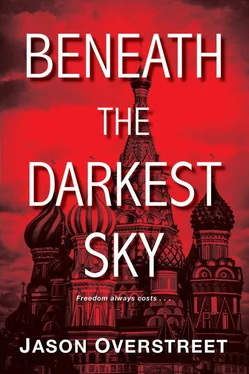“Done,” said Bobby. “I’ll track Dallas down through some Military Intelligence friends of mine. I’ll cable them today. I believe the old veteran works out of Paris now. But once I make contact with Dallas, I’ll have him meet us in Brussels. We can do no communicating regarding the specifics of this via cable or telephone. The Nazis have all modes of communication under surveillance. Besides, Dallas knows that anyone from a U.S. embassy contacting him about a sit-down is code enough for it to be worth his time.”
“Excellent,” I said. “I know that you are here to do a very important job at the embassy. Try to focus on it. Try to be present with Dorene and the children, too. Tell them the divorce story and I’ll play along. I’m here to be your interpreter and assistant as planned. I just need something in that briefcase every month.”
“There is nothing in this world that could stop me from exhausting every option possible to help you, Press.”
“Thank you,” I said. “Judging from how Loretta and Ginger looked, and how sick James has been, I don’t think they’ll make it much longer. Plus, I don’t believe the head of their camp, a man named Colonel Ivan Zorin, will treat them well. Zorin is the head of MR4 Labor Camp where Loretta and Ginger have been all this time. James is there now, too. And he’s having trouble with his lungs, something that truly has me worried… but back to Zorin. He is an animal of a man, the worst—a notorious executioner. I don’t think he cares if my family lives, even though the Kremlin sees them as leverage. They have every reason to believe I will do legit spy work based on this. Why wouldn’t they? They know I can’t have you all negotiate anything.”
“True,” said Bobby. “As far as they’re concerned, they’ve got you by the balls.”
“But back to Zorin,” I said. “He knows that even if my family dies because of his inability to keep from being a monster, he’d just lie and tell me they were still alive. And let’s say they do live, and I complete this job, and Stalin releases us, he’d never let us leave the Soviet Union. We’d be monitored for the rest of our lives. He wouldn’t want me, an embassy employee, to tell the world about his death camps. I know I’m risking it all with this move, but it’s all I’ve got. I’m desperately trying to hold on here for dear life and the big clock is ticking.”
* * *
When February 6th arrived, I sat outside on the patio at the Golden Café sipping my coffee and finishing up a plate of toast, scrambled eggs, and cold salami. The entire block was busy, just as Colonel Zorin had predicted, and across the way at the Blue Lion, I assumed, sat my contact, Dieter. Wherever he lived wasn’t far from me. I had secured a tiny, furnished apartment just up the block.
Taking a bite of toast, I looked down at my German-made Aristo stainless-steel watch, a gift from Bobby, and made note of the time: 7:30. I then eyed my briefcase and imagined how the Kremlin would react when they opened it to find notes I’d written regarding a fictitious correspondence that had taken place between U.S. Secretary of State Cordell Hull and Bobby.
The fabricated lines by Hull that were certain to feed Stalin’s massive ego were the following: “President Roosevelt was most disturbed to see Time magazine list Adolf Hitler as its 1938 Man of the Year and feels that the editor’s rationale for doing so remains unpalatable. As a result, folks within his administration are pressuring the magazine to make sure Stalin is named 1939’s Man of the Year.”
Bobby had typed up the fictitious note from Hull on U.S. State Department letterhead and had signed the Secretary of State’s name on it. Then he’d had me photograph the letter, as if I’d stolen it from his desk. The idea worked because actual mail was indeed being sent back and forth between D.C. and Berlin, and embassy couriers had been hired to both pick up and receive it directly from our American ships. Such precautions were required due to German officials combing through the regular mail.
What gave this particular briefcase delivery a hell of a lot of credibility involved some notes I’d taken regarding an actual meeting that Stalin was trying to organize between his man, Maxim Litvinov, and Germany’s Minister of Foreign Affairs, Joachim von Ribbentrop. But Hitler was only willing to consider the meeting if Litvinov was replaced. His reasoning? Litvinov was Jewish.
I figured Stalin would love finding out that his desired meeting just might happen if he were to simply replace Litvinov. And once said meeting did take place in the future, I’d have all the more credibility. Stalin would wonder how the hell I’d found out about this, but unless or until he asked, I wasn’t going to worry about it.
I was, however, impressed with how Bobby had actually found out about Stalin’s desired sit-down with Germany. He’d been receiving messages from a top-level informant who was embedded within the German government, a man who was part of a team of folks who wanted to oust Hitler. Bobby had learned of the informant from another anti-Nazi, German diplomat who’d been stationed in Argentina with him.
“Don’t think for a second,” Bobby had said, “that the United States doesn’t have its own spies in many nations, including Germany and the Soviet Union. And they’re not Americans, but rather, locals who oppose their country’s politics. Our German spy is an anti-Nazi.”
“How does he communicate with you?” I had said.
“There’s a certain dry cleaners that has the most amazing owner. He would poison Hitler if given the chance. Our mole and I love having him clean and press our suits. I’ll leave it at that.”
“Fair enough,” I had said.
“We can thank President Roosevelt for realizing the importance of America’s need to begin matching Britain, Germany, and the Soviet Union when it comes to international spying. During his time as Assistant Secretary of the Navy, Roosevelt’s interest in the spy business was born. And now, I believe he only intends to grow his global, covert apparatus. Maybe he could use you and your multilingual abilities, Press. But that’s certainly a story for another day.”
Again I looked at my watch and then the briefcase. The Kremlin would also find two fictitious lines about Poland of interest, the first in which Hull says, “The President understands that Hitler anxiously wants to attack Poland from the west, and he’s hoping like hell that they won’t, all the while, remaining steadfast in his belief that the U.S., Britain, France, and the Soviet Union will continue to show that they are the real world powers.” The second in which Hull says, “We believe Hitler is envious of Stalin’s calm and resolve, and rightfully so.”
The following information was not going to be put in my briefcase, but one thing I had come to learn since arriving at Bendlerstrasse 39 was that the U.S. was already keenly aware that Stalin and Hitler were preparing some sort of an alliance, one in which they would share in the carving up of Poland. In fact, we had no intentions of stopping them from attacking Poland, even if our allies, Britain and France, decided to defend them.
The two countries had not signed any official pact yet that made official their intentions of protecting Poland; still, embassy folks could smell one coming. But again, zero information I’d ever send would make this known to Stalin. Bobby and I only intended to nibble around the edges. Nothing sent would affect Stalin’s decisions, one way or the other. Whatever he intended to do, he was going to do.
I’d also included in my briefcase a letter requesting that the Kremlin look into having Lovett transferred from Magadan to MR4 so that he could eventually be released with my family. I was looking forward to their response.
Читать дальше











